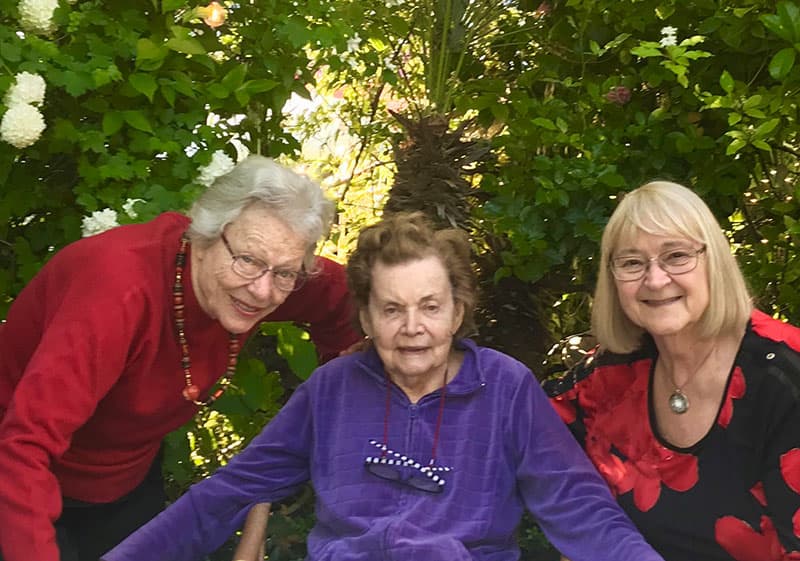
I always enjoy telling the story of how I met Dusty Roads at the local YMCA swimming pool, which was an unexpected and serendipitous event. I had been swimming laps after water aerobics class while my friends went to the hot therapy pool to soak and chat about their weekend. When I finished my workout, I headed toward that pool. I noticed my friends surrounding two vibrant and elegant elderly ladies who were pristinely coiffed, had perfectly applied makeup and lipstick and wore earrings that matched the color of their swimsuits. The ladies had already mesmerized my friends.
When my friend Elizabeth saw me approaching, she waved at me, urging me to quicken my pace.
“Hurry up, Elaine. You’ve got to meet these ladies and hear their stories!”
So I joined them and listened to Dusty tell us what it was like to be a stewardess in the 1950s while fighting discrimination when most of us were still young girls. She told us about stewardess training, the rules about being fired if they got married, and what it was like to be subjected to pre-flight “girdle checks” by female supervisors who would flick their fingers at their rear ends to ensure they were wearing them. Her friend, now wife, Jean Montague, was there too. She had her own story about being a stewardess: American Airlines fired her at age 32 due to a mandatory management policy implemented in 1953.
When Dusty became a stewardess, women were prohibited from becoming commercial pilots. But, because she always wanted to fly and it was the only way for women to do so, she applied and was hired right out of college. Hiring prerequisites were strict and uniquely feminine for that era. They were required to be college graduates, female, white, single (not divorced, separated, or widowed), and attractive “just below Hollywood” standards. There were height and weight limits, and they had to have plenty of poise and personality. At the time, sexual and racial discrimination in the workplace was common and legal. In addition, stewardesses endured lifestyle restrictions and rigid rules for hairstyle and makeup.
In 2011, Dusty was proud she had been selected, interviewed, and featured in the first PBS Makers 100 women who Make America documentary, “the story of women’s advancement in America over the past 50 years…from the perspectives of courageous groundbreakers continuing to shape the world today.” It was a project promoting the idea that the advancement of women came not from just “the actions of a few” but from “a tremendous number of women from all walks of life who, step by step, have changed the landscape of opportunity” in our country.
Later, I searched for Dusty online and found her interview video clips on the PBS archive. I was fascinated because her activism preceded and overlapped with my feminist activities at UCLA. Then I found some books that mentioned her contributions to women’s rights. I wondered if she knew about them and if she had written about her experiences.
When I saw Dusty and Jean in the pool again, I told them what I found online. Dusty never wrote an autobiography, although many had told her she should. Instead, she was interviewed and proud of her inclusion in “Moving the Mountain, “ a book about feminist history by Flora Davis published in 1991. She was genuinely surprised when I told her about the other books that mentioned her. I asked her if anyone had ever approached her to write her biography.
She lamented that no one had. That’s when I said, “I want to write it.” She grinned and said, “I’ve just been waiting for someone to ask!” And that was the beginning of our friendship, many years of interviews and the book I was destined to write.